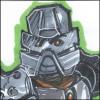Late last night, I was up thinking (uh oh), and the most random question popped into my head: what Hogwarts house would Ron Swanson be in?
The answer became very complex very quickly, because Ron Swanson—like all of the Parks and Recreation characters—is more interesting than a some actual people, which makes a simple classification tricky.
But Hogwarts houses shouldn't just be a simple classification, which is what they've boiled down to. They're flanderized and there's not much that Rowling does to stop this from happening.
In truth, the four aspects that define each house are not mutually exclusive. While the sorting process is intended to group students based on which of the four aspects is the biggest, that would result in less homogenous houses than are portrayed.
For an example, let's look at Slytherin. Its members are depicted as varying levels of evil, when in truth, Slytherin is about cunning and self-preservation. As such, while it makes sense for the bad guys of the series to have Slytherin affiliation, it should, by its very definition, be a complex house. Were good Slytherins subjugated by the Malfoy types of the house? Were there secret friendships between Slytherins and members of other houses? These things are never elaborated, and Slytherin remains the Evil House—not unfairly by any means, but as it stands no argument can be made for it being good.
In truth, the Slytherin case shows the underdeveloped nature of the non-Gryffindor houses, and it wouldn't really take that much to make it more nuanced. A Slytherin who joins forces with Dumbledore's Army, or perhaps rewriting one of the Harry-finds-out-important-details-by-overhearing-some-people scenes to have a Slytherin, troubled by the actions of their house, spilling some beans to Harry and the gang.
Oh, and Ron Swanson's totally a Slytherin.
-
 5
5



8 Comments
Recommended Comments